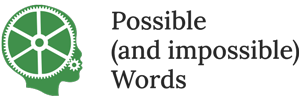All my life, I have been fascinated by speech and language…. I remember at school one day our teacher showed us a picture of a cat on a mat…. “C, A, T makes cat”
Childhood curiosity
Long before I learnt to read, I remember asking myself why my parents said DROING ROOM when there were no other words like DROING. There was paint, point, pint, pound, pint, pond, but no POING or POINK or HOING or TOING or DROING. It didn’t occur to me to ask my parents.
My parents would probably have told me that in the days of my grandmother (who had largely designed the house) it was the custom for men and women to separate after dinner. And one group would go to the drawing room or withdrawing room. My curiosity about DROING was probably my first thought about linguistics.
I was also very late learning to read. That I can remember. And I was told that I was very late learning to talk intelligibly.
Possible words – therapy and a lost tradition
I worked mainly in community clinics as a speech and language therapist in the British National Health Service. My work covered a broad range of issues, including language development, what are commonly regarded as articulatory issues, deep unintelligibility, but also fluency and voice.
I then started doing research which ended in 2002 as a PhD in linguistics at the University of Durham. I described some well-known patterns in children’s speech errors and some which had not been described before. I asked: Why do errors pattern the way they do? It is odd that they pattern at all. And I described the therapy which I had been developing since 1983. This was based on possible words, rather than actual words, making use of the patterns which occur naturally in children’s speech. Surprisingly, perhaps, a carefully structured sequence of possible words seemed to be therapeutic.
More research has shown that this idea of working with possible words was in fact an update of thinking which was seemingly first proposed in 1669. One aspect of my updating is with respect to word stress, as in the difference between cannon and canoe.
I qualified as a speech and language therapist in 1979, going on to work in the NHS. I treated a broad range of issues. I then went on to do a PhD at the University Durham. I now find that not being registered with the Health Services Professional Council, or HSPC, I cannot call myself a speech and language therapist, and do not, therefore, do so. I am now in the process of registering with the HSPC. In the meantime, I work as a clinical linguist, specialising in those issues relating to the learnability space. in other words, those issues which arise because the process of learning to talk has somehow stopped or failed. I also write and carry out research.
Being positive
In my treatment, I mostly try to hide the fact that I am trying to help a child to say something which he or she has not said before. Some small children are well aware of the fact that they need help with their speech. But to my way of thinking there no advantage in making this more evident than it already is. So unless a child actually asks for explicit feedback (and some children do), I prefer just to congratulate them for whatever they say, no matter whether this is right or wrong. If they don’t say things quite right I proceed on the basis that I should have adjusted the task to make sure that the child’s effort was successful. Success is more motivating than failure. The learning is from the structuring of the tasks. (See Nunes, 2023).
Degrees
I have four degrees, in sociology, in theoretical linguistics, and in speech and language therapy. For my PhD I investigated the relation between current linguistic theory and the range of incompetences that are heard in the clinic, some minor, some profound, and from normally developing children. This was in a framework broadly inspired by the work of Noam Chomsky. I successfully defended my thesis in 2002.
The how and why
Ever since I went to university and after some more training became a speech and language therapist, I have been fascinated by the intersections between sociology, psychology, biology, and linguistics.
Noam Chomsky and others talk about ‘the logical problem of language acquisition’. But there is also an emerging question about how speech and language evolved in the human species – what Chomsky now calls ‘evolvability’.
The reason I make the theoretical choices I do is that there seems to be a close connection between the issue of evolvability and problems of speech and language development in children. Developing the two main themes of my PhD, I make the case for this as a proposal, keeping the primitives as simple and parsimonious as possible, in line with standard scientific practise in all fields.
British Sign Language
For family reasons, I am learning British Sign Language.


